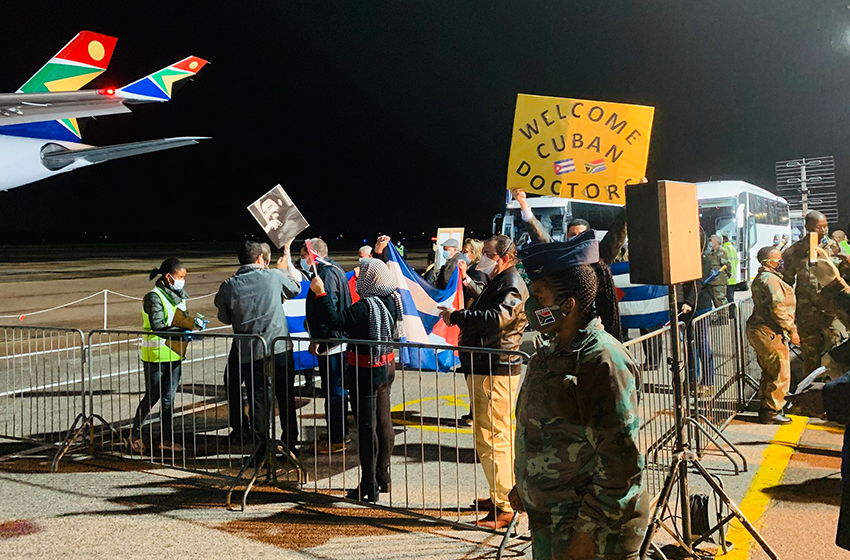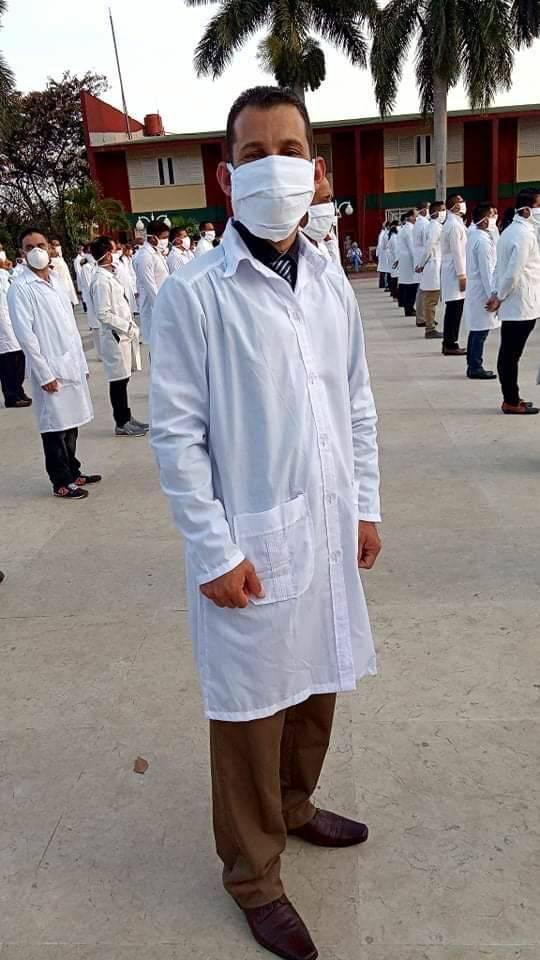
"It is not easy for us to maintain hygiene at a height of 11 thousand meters," says Yosvanis Díaz Hechavarría, describing the 18 hours that took to travel to South Africa.
Las Tunas, Cuba.- The graduate from the Electro-medicine Major, of the province of Las Tunas, is opening a new chapter in his life, this time as a member of the Henry Reeve International Medical Contingent Specialized in Disaster Situations and Serious Epidemics, which came to that nation in the southern hemisphere to face the pandemic of the new coronavirus.
“We had to be all the time with the mask. Despite the fact that they gave us a test and we all were negative, you cannot trust. We slept and some even snored because exhaustion overcame us,” he says. Some days have gone of preparation through two courses on the characteristics of this disease, with an emphasis on biosafety standards, while receiving preventive treatment to strengthen their immune system.
Because of his specific job, Yosvanis will not have direct contact with patients, but that does not mean that his task will be easy. “As an electro-medical doctor, he explains, I will have to manipulate, for example, mechanical ventilators, as well as vital sign monitors, infusion pumps, perfusion pumps, among others.
These equipment are operated by medical personnel who, in turn, are in contact with patients; therefore, there are risks. Then, like them, we will have to use all the means of protection: mask, protective goggles, gloves as if we were facing a positive patient and also subject the equipment to a disinfection process before proceeding to repair it.”
 It is not the first time that he fulfills an internationalist mission and it is precisely this previous experience that allowed him to now join the "Henry Reeve". "Like doctors, we have specialties depending on the line of equipment we serve. To mention some, there is the Life Support, which includes the fans; the Medical Electronics, which deals with matters related to the monitoring of treatment; laboratory and electro-mechanics, or stomatology. Back in Las Tunas, I worked Medical Electronics, but in the period I was in Venezuela I participated in a project of technical services to hospitals and I had the opportunity to prepare myself in Life Support, which is exactly what is needed to face the COVID-19.”
It is not the first time that he fulfills an internationalist mission and it is precisely this previous experience that allowed him to now join the "Henry Reeve". "Like doctors, we have specialties depending on the line of equipment we serve. To mention some, there is the Life Support, which includes the fans; the Medical Electronics, which deals with matters related to the monitoring of treatment; laboratory and electro-mechanics, or stomatology. Back in Las Tunas, I worked Medical Electronics, but in the period I was in Venezuela I participated in a project of technical services to hospitals and I had the opportunity to prepare myself in Life Support, which is exactly what is needed to face the COVID-19.”
Besides, he knows he has a lot to learn. “A pandemic of this magnitude is something new that we are going to face. Our country has prepared us to work with modern technologies similar to those we have in our Health System,” he assures.
THE DECISION
Integrating this select team of specialists is not an easy decision since it is about joining those who will always be in high-risk places and that for any family means dealing with the true danger for some of its members.
Yovani was no exception. Also because going to South Africa meant that he did not stop to think that he was later expected to provide his services in Qatar, without a doubt, a much less complicated place. “If I am required to stay here I will. We have been taught since we were children to give our best without personal interest," he says.
His children, a 7-year-old girl and a 5-year-old boy, only this week found out where their father is when they saw the television report. "I didn't dare say anything to them, because they are very attached to me. I have communicated every second that I am here. I even say good night to them before bed. That is something I have to do on a daily basis,” he insists.
EXCITED BY THE RECEIPT
It is still a few days before Yosvanis and the rest of the brigade take action. While the period of preventive quarantine lasts, they will take advantage of the time to become familiar with the specific protocols of South Africa for this type of situation.
The reception of the hosts, he stresses, has been effusive. "Coincidentally, we arrived on Freedom Day in South Africa, the same date that Fidel did when he came to the first time in office of Nelson Mandela in 1994," he highlights.
Several South African government authorities were waiting for them at the air terminal on April 27. "I thank you all for this beautiful gesture," said Jackson Mthembu, minister of the presidency. "The advantage of Cuba is that it is a community health model, one that we would like to use," South African Health Minister Zweli Mkhize had stated at a press conference earlier this month when the arrival of the Cuban brigade.
Cubans like Yosvanis are now in South Africa making those words of Fidel come true, precisely, before the South African Parliament: "Let's be more generous, more caring, and more human."




